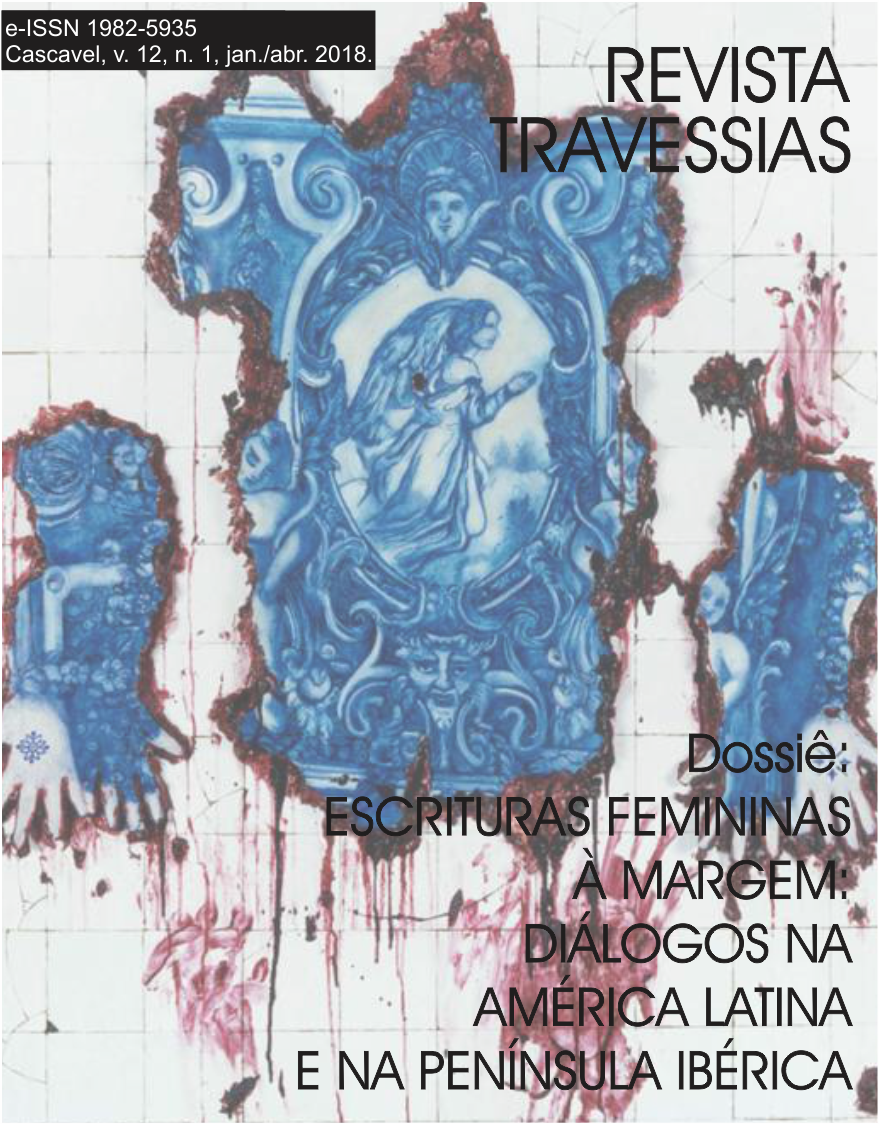Levemos a mulher à Academia Brasileira de Letras! Tetrá de Teffé, a primeira romancista premiada pelos imortais
Palavras-chave:
Academia Brasileira de Letras, escritoras, cânone, Tetrá de Teffé.Resumo
Este artigo tem como objetivo analisar o papel das mulheres intelectuais e escritoras durante a década dos anos trinta e quarenta no Brasil, enfocando o seu estudo na romancista Tetrá de Teffé e na sua obra Bati à porta da vida, galardoada em 1941 com o Prêmio Machado de Assis, prêmio outorgado pela Academia Brasileira de Letras. Por um lado, se estuda o cânone literário como um espaço eminentemente patriarcal e, assim, busca-se compreender os conflitos existentes em relação ao ingresso das mulheres no panteão dos imortais, a Academia Brasileira de Letras. Por outro lado, através do semanário carioca O Malho, examina-se os discursos construídos pela imprensa e pelas próprias intelectuais para reivindicar a sua participação em um lugar de consagração cultural. Neste artigo, pois, há vidas esquecidas de mulheres brilhantes que foram importantes atrizes na arena política, social e cultural brasileira, mas que terminaram no porão da história e do cânone literário. Entre estas mulheres encontra-se Tetrazzini de Almeida Nobre de Teffé, escritora brasileira de grande prestígio durante as primeiras décadas do século XX. Porém, o status não-canônico de sua obra, tão frequente no caso de mulheres escritoras, demonstra a invisibilização e o silenciamento que sofreram diversas mulheres das letras.
Downloads
Referências
AGUADO, Ana e SANFELIU, Luz. Caminos de Democracia. Ciudadanías y Culturas Democráticas en el Siglo XX. Granada: Comares, 2014.
AMADO, Jorge. Anuario Brasileiro De Literatura. Rio de Janeiro: Pongetti, 1941, p. 25.
ASMAR FANINI, Michele. A (in)visibilidade de um legado. Seleta de textos dramatúrgicos inéditos de Júlia Lopes de Almeida. São Paulo: Fapesp, 2016.
ASMAR FANINI, Michele. As mulheres e a Academia Brasileira de Letras, História, 29, 1 Franca, 2010, p. 345-367.
BOURDIEU, Pierre. O poder simbólico. Rio de Janeiro: Bertrand Brasil, 2010.
CÂNDIDO, Antônio. Literatura e Sociedade. Rio de Janeiro: Ouro sobre azul, 2010.
CAPDEVILA-ARGÜELLES, Nuria. Autoras inciertas. Madrid: Sílex, 2017.
CHAUDHURI, Nupur. Contesting arquives: Finding women in the sources. Illinois: University of Illinois, 2010.
EL FAR, Alessandra. A encenação da imortalidade: uma análise da academia brasileira de letras nos primeiros anos da república (1897-1924). Rio de Janeiro: FGV, 2000.
FERNÁNDEZ AUZMENDI, Nazaret. El canon literario: un debate abierto. Per Abaat, 7, 2008, p. 61-82.
FERREIRA, Antônio Celso. A fonte fecunda. In: PINSKY, Carla Bassanezi; DE LUCA, Tânia Regina (Org). O historiador e suas fontes. São Paulo: Editora Contexto, 2009.
GAL, Susan. Language and the art of resistance. Cultural Anthropology, 10, 3, 1995, p. 407-424.
GOMES, Ângela Maria de Castro. História e historiadores. A política cultural do estado novo. Rio de Janeiro: FGV, 1996.
KARAWEJCZYK, Mônica. Urnas e saias: uma mistura possível. A participação feminina no pleito eleitoral de 1933, na ótica do jornal Correio do Povo. Topoi, 11, 21, 2010, p. 204-221.
KILOMBA, Grada. Plantation Memories: Episodes of Everyday Racism. Münster: Unrast Verlag, 2012.
KOTHE, Flávio. O Cânone colonial: Ensaios. Brasília: Editora Universidade de Brasília, 1997.
LEFEVERE, André. Traducción, reescritura y la manipulación del canon literario. Salamanca: Ediciones Colegio de España, 1997.
LIMA DUARTE, Constância. Feminismo e Literatura. Estudos Avançados, 17, 49, 2003, p. 151-172.
LOTMAN, Mijaíl Iuri. El arte canónico como paradoja informacional. Criterios, 30, 1993, p. 23–29.
MARSHAL, Thomas. Ciudadanía y clase social. Revista Española de Investigaciones Sociológicas, 79, 1997, p. 297-344.
REIS, Roberto. Cânon. In: JOBIM, J.L. (org). Palavras da crítica. Tendências e conceitos no estudo da Literatura. Rio de Janeiro: Imago, 1992, p. 65-92.
RIBEIRO, Djamila. O que é lugar de fala?. Belo Horizonte: Letramento, 2017.
SAID, Edward. Cultura e Imperialismo. São Paulo: Companhia das Letras, 2005.
STANFORD FRIEDMAN, Susan. The return of the repressed in women’s narrative. The Journal of Narrative Technique, 19, 1, 1989, p. 141-156.
TEFFÉ, Tetrá de. Bati à porta da vida. Rio de Janeiro: Pongetti Editores, 1941.
FONTE PRIMÁRIA
A NOITE, 1940, 26 de setembro, p. 14.
O MALHO, 1936, 13 de agosto, p. 13.
O MALHO, 1936, 27 de agosto, p. 19.
O MALHO, 1936, 17 de setembro, p. 20.
O MALHO, 1936, 24 de dezembro, p. 28.
O MALHO, 1937, 4 de novembro, p. 21.
Downloads
Publicado
Como Citar
Edição
Seção
Licença
Aviso de Direito Autoral Creative Commons
Política para Periódicos de Acesso Livre
Autores que publicam nesta revista concordam com os seguintes termos:
1. Autores mantêm os direitos autorais e concedem à revista o direito de primeira publicação, com o trabalho simultaneamente licenciado sob a Licença Creative Commons Attribution que permite o compartilhamento do trabalho com reconhecimento da autoria e publicação inicial nesta revista.
2. Autores têm autorização para assumir contratos adicionais separadamente, para distribuição não-exclusiva da versão do trabalho publicada nesta revista (ex.: publicar em repositório institucional ou como capítulo de livro), com reconhecimento de autoria e publicação inicial nesta revista.
3. Autores têm permissão e são estimulados a publicar e distribuir seu trabalho online (ex.: em repositórios institucionais ou na sua página pessoal) a qualquer ponto antes ou durante o processo editorial, já que isso pode gerar alterações produtivas, bem como aumentar o impacto e a citação do trabalho publicado (Veja O Efeito do Acesso Livre).
Licença Creative Commons
Esta obra está licenciada com uma Licença Creative Commons Atribuição-NãoComercial-CompartilhaIgual 4.0 Internacional, o que permite compartilhar, copiar, distribuir, exibir, reproduzir, a totalidade ou partes desde que não tenha objetivo comercial e sejam citados os autores e a fonte.



